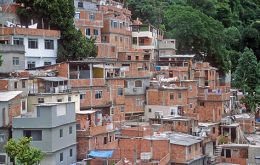MercoPress. South Atlantic News Agency
Brazil
-
Saturday, September 4th 2010 - 05:01 UTC
Brazilian economy slows down but still expands at annualized 8.9%

Brazil's economy grew 8.8% in the second quarter compared to the same period a year earlier due to strong domestic investment. The government statistics agency IBGE said Friday that capital spending spiked 26.5% in the April-June period compared to the same period last year.
-
Thursday, September 2nd 2010 - 07:21 UTC
Brazilian central bank keeps benchmark interest rate on hold at 10.75%

Brazil's central bank held on Wednesday its benchmark interest rate at 10.75%, ending a monetary tightening cycle that helped cool the economy as the country prepares for October 3 presidential election.
-
Thursday, September 2nd 2010 - 07:10 UTC
Brazil announces major iron deposit discovery in Matto Grosso

Brazil's Mato Grosso state government announced Wednesday it had registered a major mineral deposit discovery with an estimated 11.5 billion tons of iron ore of a 41% Fe grade plus another 428 million tons of phosphates.
-
Thursday, September 2nd 2010 - 06:50 UTC
Caterpillar expands manufacturing operations in Brazil to cater Mercosur

Caterpillar Inc. (NYSE: CAT) announced Wednesday the expansion of its manufacturing operations in Brazil capitalizing on the expected growth of demand in the Mercosur regional block and Latin America.
-
Wednesday, September 1st 2010 - 06:37 UTC
One of Brazil’s media icons becomes first 100% digital newspaper

Starting Wednesday September 1, 2010, Jornal do Brasil, celebrating its 119th year, will become the first 100% digital newspaper in Brazil.
-
Wednesday, September 1st 2010 - 06:34 UTC
Brazilian July industrial output grows at lower than expected rate

Brazilian industrial production output experienced an increase of 0.4% in July from a month earlier, which is less than expected according to a report released by the Brazilian national statistics bureau IBGE in Río de Janeiro, compared with a 1% decline in June.
-
Wednesday, September 1st 2010 - 06:10 UTC
Brazil promotes tourism to Rio’s (crime-free) favelas (shanty towns)

Tourists usually try to run from Brazil’s Rio do Janeiro's notorious slums. Now officials headed by President Lula da Silva are inviting them to come and visit instead. The Santa Marta shantytown this week became the first community in a program meant to promote tourism in the poor neighbourhoods that are home to some unique music and art work.
-
Wednesday, September 1st 2010 - 06:02 UTC
Brazilian beef producer wants to sell abattoirs and reduce Argentine operations

Brazil’s JBS, the world's top beef producer is trying to sell three of its Argentine plants due to government policies that have depleted cattle stocks and supply and hurt profits, a trade group said on Tuesday.
-
Wednesday, September 1st 2010 - 05:57 UTC
Colombia’s Santos meets Lula da Silva in his first overseas visit

Colombian president Juan Manuel Santos arrived Tuesday in Brazil for an official two-day state visit that begins Wednesday with a meeting with President Lula da Silva to address a regional political agenda and strengthen bilateral trade.
-
Wednesday, September 1st 2010 - 02:48 UTC
Lifting Mercosur out of its “institutional paralysis”, Rousseff’s main challenge

Consolidating South American integration would be the main foreign policy priority of the Brazilian ruling party presidential candidate Dilma Rousseff if public opinion polls are confirmed at the ballot box next October 3 and she emerges as the successor of Lula da Silva.
